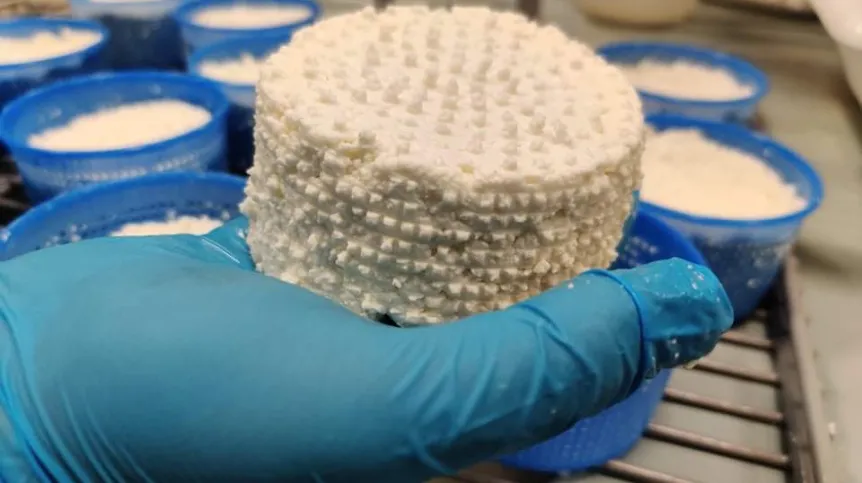
Is it possible to develop plant-based alternatives to soft cheeses that maintain the specific taste and aroma, while being suitable for vegans and vegetarians? Scientists at the West Pomeranian University of Technology in Szczecin believe that it is.
They used Based on oilseed cakes, today a waste product of the oilseed industry, to create plant-based alternatives to famous French cheeses such as Camembert and Roquefort that taste and smell almost like the original products, are fully plant-based, have high protein content, and are rich in valuable bioactive substances such as vitamins, antioxidants, anti-inflammatory compounds, and cholesterol-lowering agents.
The team leader is Dr. Łukasz Łopusiewicz from the Faculty of Food Sciences and Fisheries at the West Pomeranian University of Technology. He says that dietary trends have changed significantly in recent years; consumers now pay attention not only to the flavour of products, but also to their health and ethical aspects. Hence the growing popularity of vegetarian and vegan diets and the rapidly growing market of plant-based food.
It is a challenge for producers to develop new, increasingly sophisticated plant-based substitutes of cheese, milk, meat, fish, etc. with the right taste, aroma and texture. This is not easy, which is why the available alternatives often have low nutritional value, contain a lot of sugar, saturated fats and unnecessary additives. They are also expensive.
Scientists from Szczecin have now come up with an innovative idea to use oilseed cakes (pulp waste from oil extraction from oilseed plants) to produce plant-based foods (read more about it here and here).
Dr. Łopusiewicz said: “We decided to use edible mould strains that are used to produce classical soft and blue cheeses such as Camembert and Roquefort, and it turned out that they grow very well on oilseed cakes, especially those from flax and sunflower.”
The two types of oilseed cake differ in their bioactive substance content. Flaxseed cake is rich in linolenic acid, polyhenols and lignans. Sunflower seed cake contains a lot of vitamin E, B-group vitamins, phytosterols and unsaturated fatty acids.
What they have in common is a high protein and polysaccharide content and low calorific value.
The researchers have developed a technology that is as close as possible to the traditional production of real, milk-based camembert and fully consistent with the cheese-making craft. First, the prepared cake is inoculated with lactic acid bacteria cultures and selected strains of Penicillium camemberti and Geotrichum candidum. These are edible moulds used in Camembert cheese production. Then they salt their product and leave it for at least 6 weeks in refrigerated conditions to ripen.
The resulting product resembles French cheese in numerous ways.
Dr. Łopusiewicz said: “Mould cultures grow very well on oilcakes, forming a characteristic rind. During the ripening of classic Camembert cheese, two main processes take place: proteolysis, i.e. the breakdown of proteins, and lipolysis, i.e. the breakdown of fats. Thanks to them, Camembert gains its specific, semi-liquid interior as well as its characteristic taste and aroma. Due to the fact that in cakes both processes are very similar to those in milk-based cheese, our products taste and smell very much like their traditional counterparts.”
Detailed analyses confirmed the perception of the researchers and testers of plant-based alternatives - their taste and aroma profile turned out to be similar to that of real cheese, even 75-95 percent of volatile compounds were identical.
Dr. Łopusiewicz said: “The similarity in some cases (depending on the starter and oilseed cake) is so high that if the consumer were to closed their eyes and evaluate which product is the plant-based alternative and which is the classic cheese, they would have a big problem.
“This is important because we do not use any aroma-enhancing substances or artificial aromas in the production process. The ability of the microorganisms we use to biotransform (produce enzymes, organic acids, ferment, etc.) plant-based materials gives this effect.”
As for the appearance, it depends on the type of oilseed cake: products can be light or dark in colour, more or less solid inside. Due to their low fat and high fibre content, such cheeses have a low calorific value, while providing beneficial fibre that can help maintain proper intestinal health, for example by stimulating the growth and development of beneficial microflora.
Laboratory studies have shown that plant-based cheese alternatives not only contain many beneficial lactic acid bacteria, but also a number of compounds with health-promoting properties.
The research was co-financed with the Polish National Science Centre grant under the scientific action Miniatura 5, project 'Ripening of a plant-based cheese analogue with mould rind. Do proteolysis and lipolysis processes occur similarly to traditional Camembert cheese?'
Thanks to cooperation with other teams, Dr. Łopusiewicz's group also investigates which volatile compounds that shape the aroma of the products form during ripening, and can trace changes in their proteome, or protein profile, and observe many similarities between plant and dairy products, for example protein breakdown due to metabolic activity of mould and release of bioactive peptides with potential health-promoting activity.
Łopusiewicz said: “All these topics are extremely interesting and we will certainly continue to develop and expand them.”
Camembert is not the only cheese for which the researchers from Szczecin are developing plant-based alternatives. They are also testing recipes for blue cheeses, such as equivalents of gorgonzola or Polish Lazur. The results are very promising.
Other research areas of the team include plant-based alternatives to yoghurt, kefir, and powdered milk, beer alternatives based on oilseed cakes and brewing yeast, and kombucha. The team are also working on plant-based food additives (emulsion stabilizers and fat substitutes). In the future, they also plan to work on oilseed cake-based alternatives to Asian food.
The researchers added that the use of oilseed cakes in food production is a beneficial solution for everyone: the oil industry that can sell the material previously treated as waste, the food industry because oilseed cakes are very cheap and very nutritious, and consumers themselves, who gain tasty, healthy, nutritious, low-calorie and environmentally friendly products.
Dr. Łopusiewicz said: “In conclusion: we are only limited by our imagination.
“The key is an unconventional approach to combining different components.”
PAP - Science in Poland, Katarzyna Czechowicz
kap/ agt/
tr. RL













